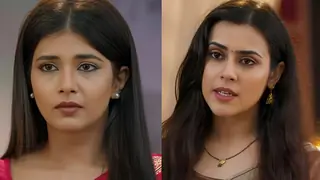Hey guys,
One exam is left; a lot of holidays are there so thought of writing a SS, yeah I was itching to write again. Alekhya, this one's for you and Ranju for you too!I was reading an article about story writing; suddenly I realized that the FFs I write are so different than a bound novel. FF is a story but there are some broken lines between unlike a novel which has a flow to it!!! FFs are like writing an episode, novel is continuous. So I felt like writing a story without any breaks, like a comprehension.
This is a story inspired by Salman Rushdie's short story, I am not fond of his work, but he surely does have a charismatic personality. I was watching a documentary on how he wrote 'Midnight's Children'; this man has such a unique hierarchy.
ENJOY!!!!
XXXXX
Pieces of Time… …
Eyes as lustrous as the unblemished mirror, long locks of hair as thick as the dark clouds, lips as luscious as the wet rose petals, voice as sweet as the purest of honey, skin gleaming with a radiance so bright, she was the perfect woman, a beauty never seen, never heard… …
Jai opened his eyes groggily; irritated by the striking sun rays…he sat up rubbing his eyes; every night he had the same dream, of an enchanting woman, he could till now never see her face but he knew exactly how she would look, he was a young boy when he first dreamt of it, he just ignored it but since then the same dream reoccurred, to the extent of following him since years like an eternal quest…
"Dream girl…" nachiket, his cousin grinned...jai gave him a bored look, throwing away the blanket…
"I guess you are coming…" jai asked in his partially Hindi, partially English accent…
"Please, all those forts and museums, I don't know what you see in them…" nachiket plopped on the couch, his legs dangling in the air, the curve of his knees resting on the arm of the couch…
"Culture and heritage…" jai responded squeezing the paste on the zigzag bristles of the toothbrush…
"Whatever…I have arranged a car, you enjoy…"
"Cool!!!"
Nachiket looked at jai as he went inside the bathroom, even though he was born and brought up in America but there was no ounce of pride in him or any form of high-handedness, he was too rooted and surprisingly had a penchant for India, its culture, history, art, traditions, in fact he was more well-versed about India and knew things which he himself also didn't know, he was his paternal uncle's son, Jai Walia was born to a mixed breed…His father, Uday Walia fell in love with a pretty Muslim girl in his neighborhood, Zaara Sheik, neither families agreed to this inter-religious marriage, and that of two religions so starkly opposing and contradictory. There had been a lot of hullabaloo with zaara's brother attacking uday who was seriously injured. As history had it love could transcend any barrier, uday and zaara eloped and went to America where uday had got a handsome job…they never returned back even though their respective families tried to patch up a decade later. After so many years there was a happy occasion in the family, Uday's brother's daughter was getting married and they were invited. After years, now they want to live happily this was what uday grunted seeing the card and the listening to his brother who called him, he was still angry over the fact the he had to run leaving everything only because of them, though Zaara wanted to go but refrained knowing uday, but Jai was too excited to go to India, he always had wanted to go there…"There was something in India…".
Jai tied his shoe lace and got up, the last few days had been so hectic meeting his enormous and diverse family, the relations were never ending…he forgot the names of all the chachas, chachis, masis, masas, phuphas, phuphis, behens, bhais, daadas, daadis…not only his father's side but also his mother's side…the preparations were going in full swing…the house was being decorated with flowers, mirror streamers and all. He had really got along well with everybody specially, Nachiket who was as same age as his, he was sweet enough to show him around Delhi, but he wanted to go to Agra and nachiket was busy…it was a one man journey then…jai ignored the appreciative glances received from the young girls as he made his way out of the clustered house, he had inherited the best of features from both his parents, tall height, board shoulders, auburn hair, bronze complexion, his mother's reflective deep eyes, he was quite aware of his looks and women falling for him was no surprise but he was so consumed by the hallucination of his 'Dream girl' that every girl he saw he only searched for his 'Dream girl'.
Jalaluddin Muhammad Akbar (???? ????? ???? ????), a name she was fascinated with, a man who caught her imagination like no other. She was always interested in history and had eventually taken it up after her twelfth standard. Bani excitedly looked out of the window of the running car, the mist blocked her view, within a few hours she would reach her destination, Fatehpur Sikri, she had to literally battle with her conservative parents for allowing her to come for her project all alone, she had inevitably chosen Akbar as her subject. Akbar, she wondered why she was so infatuated by the personality of a man born and dead centuries before her. It didn't make sense, yet it did…the car speeded on the smooth Delhi-Agra National Highway.
At dawn the haunting sandstone palaces of the new "victory city" of Akbar the Great looked as if they were made of red smoke. Most cities start giving the impression of being eternal almost as soon as they are born, but Sikri looked like a mirage. As the sun rose to its zenith, the great bludgeon of the day's heat pounded the flagstones, deafening human ears to all sounds, making the air quiver like a frightened blackbuck, and weakening the border between sanity and delirium, between what was fanciful and what was real. Even the Emperor succumbed to the fantasy.
Shehensha-e-Hindustan, Akbar built this imposing and widespread Fatehpur Sikri which shared its imperial duties as a capital city with Agra, where a bulk of the arsenal, treasure hoards, and other reserves were kept at its Red Fort for security. During a crisis, the court, harem, and treasury could be removed to Agra, only 26 miles away, less than a day's march.
The Sufi Saint Salim Chishti from the Chishti Order who lived as a recluse in the small town Sikri near Agra. Salim predicted that Akbar would have another son and indeed one was born in 1569 in Sikri. He was named Salim to honor the saint and would later rule the empire as Emperor Jahangir. The following year, Akbar, determined to build a palace and royal city in Sikri, to honor his pir Salim Chishti. The tomb of Salim Chishti, "Salim Chisti Ka Mazar" was made to build there within the grounds of the Jama mosque.The name, Fateh is of Arabic origin and means "victory", also in Urdu and Persian. It was here the nine jewels of the Akbar's court were born.
Bani entered the fort with awe; truly Fatehpur Sikri is regarded as Emperor Akbar's crowning architectural legacy. Indeed, its numerous palaces, halls, and masjids satisfy his creative and aesthetic impulses, typical of Mughals. The layout of the city showed a conscious attempt to produce rich spatial effects by the organization of built forms around open spaces in interesting ways. Of particular note was the way in which shifts in axes occured as one moved along the city and the location of squares in important places with buildings forming a backdrop or envelope. Baninoted unlike other important Mughal cities (such as Shahjahanabad, which had a very formal planning); Fatehpur Sikri had aspects of informality and improvisation. Indeed, the city bore a similarity to the movable imperial encampment also designed by Akbar. The buildings of Fatehpur Sikri showed a synthesis of various regional schools of architectural craftsmanship such as Gujarati and Bengali. This was because indigenous craftsmen from various regions were used for the construction of the buildings. Influences from Hindu and Jain architecture were seen hand in hand with Islamic elements. The building material predominantly used was red sandstone, quarried from the same rocky outcrop on which it was situated. She walked ahead, passing the group of foreign tourists who were amusingly clicking pictures… …
Jai stood before the majestic baronial entrance of the city of Akbar; he had read in history books, the huge forts and palaces the kings built. He switched on his digital camera, taking a few snaps, he felt strange as if he had been here before, as if he was familiar with each and every brick used to construct this magnifying human miracle… He checked the pamphlet he had bought, near the entry there was Naubat Khana, drum house, where important arrivals were announced, he walked on to Diwan-i-Aam, Hall of Public Audience: a building typology found in many Mughal cities where the ruler met the general public, it was a pavilion-like multi-bayed rectangular structure fronting a large open space. Diwan-i-Khas, Hall of Private Audience, its central pillar had thirty-six volute brackets supporting a circular platform for Akbar. It was here that Akbar had representatives of different religions to discuss their faiths. Jai glanced up; turning around mesmerized by the view…he could hear echoes of whispers, a distant sound of a hefty male voice announcing Shehensha-e-Hindustan Jalaluddin Muhammad Akbar tashreef laa rahen hain… …
Standing in the outer balcony of Panch MahalBani watched the Buland Darwaza – the 'Gate of Magnificence', and the Jama Masjid which stood behind it proudly…She peeped below, there was the Pachisi Court: a square marked out as a large sized board game (modern day Ludo) where live coins- people- participated. And there was the pool Anup Talao where the legendary musician Tansen is said to have performed on the island centered in the middle. What vanity she mused, but somewhere she was in love with this vanity. Akbar was considered to be the greatest of Mughal Emperor; such a leader was not born before or after. May be because he was the first one to initiate a secular society, an epitome of courage and intelligence, he was by far a rarity of nature, but his lifestyle was a typical Florentine, who enjoyed good food, good music, good art, good drink, and good women too…he was a hidden romantic who expressed himself in the exotic Persian prose…Bani moved around, he had countless wives, men would certainly envy him but…she laughed thinking what would he have done with all those countless wives, physically it might have been heaven for him but mentally, emotionally, had there been a satisfaction, Did the Great Emperor ever did love???? Did he ever felt the need to be loved or love???What would it have been like if he loved someone??? There were misconceptions that he was madly in love with Jodha Bai, the first Rajput princes he married in a political alliance, mother of Jahangir. But many historians claim that Jodha Bai was a misnomer.
In Tuzuk-e-Jahangiri, the autobiography of Jahangir she is referred as Mariam Zamani. Neither the Akbarnama (a biography of Akbar commissioned by Akbar himself), nor any historical text from the period refer to her as Jodha Bai. But despite of all the controversies Jodha Bai continued to live on…like an evergreen memory, the women who might have captured the Emperor's heart.
Bani walked to Mariam-uz-Zamani's palace, the building of Akbar's wife was confined and secluded showing Gujarati influence and was built around a courtyard, with special care being taken to ensure privacy. Akbar hadpersuaded the Kacchwaha Rajput, Raja Bharmal, of Amer (modern day Jaipur) into accepting a matrimonial alliance for his daughter Harka Bai. This marriage proved to be a turning point in the history of the Mughal Empire, as this was the first instance of royal matrimony between Hindu and Muslim dynasties in India. She was married to Akbar at Sambhar, near Jaipur and was later rechristened as Mariam-uz-Zamani("Mary of the Age"). She was Akbar's third wife and one of his three chief queens. She was said to have been politically involved in the court until Nur Jahan became empress. She could issue official documents (farman), which was usually the exclusive privilege of the emperor. She used her wealth and influence to build gardens, wells, and mosques around the country. She was buried according to Islamic custom and was not cremated according to the Hindu religion. Still there is an ambiguity over her Rajput origin. Rajputs are said to have swapped their daughter with a low caste maid as the final revenge just before the royal marriage. Though there is no historical evidence, such stories are common among Rajputs mostly suggesting redemption of honor.
This was Akbar's private room…she was awestruck at its sheer royalty and the essence of power which still lurked around, as if Akbar would just barge in carrying his sword, Bani smelled the walls, it was peculiar, there was an eerie feel to it as if the pillars wanted to say something…she stood still unmoving…until a breeze teased her…she turned around only to be lost… …
At the fall of dusk, Akbar strolled leisurely overlooking the harem, his unnumbered queens floated within his palaces like ghosts. None appealed to him as one, she was unique, made just for him, his heart was her mother, his mind her father…Her royal personages did not really exist. She was an imaginary wife, dreamed up by him in the way that lonely children dreamt up imaginary friends, and in spite of the presence of many living, if floating, consorts, the Emperor was of the opinion that it was the real queens who were the phantoms and the nonexistent beloved who was real. He gave her a name, Jodha, and no man dared gainsay him. Within the privacy of the women's quarters, within the silken corridors of her palace, Jodha's influence and power grew. She had in no time captivated the Great Akbar's mind, body and soul.
He ordered one of the servants to inform signer Tansen that he wanted to see the work he had requested for. A few moments later he was walking towards private quarters in long strides. Akbar cried out of joy as Tansen sang the song he had written for Jodha Bai, rewarding him handsomely Akbar relived him, the notes of the song still tapping the strings of his heart.
"Abdus Samad ko hazir kiya jaaye…" he roared…his demand was put to rest in a short while…
The master painter stood in the middle, as he patiently waited for the colors and canvas to arrive…
Akbar began narrating his dream, Eyes as lustrous as the unblemished mirror, long locks of hair as thick as the dark clouds, lips as luscious as the wet rose petals, voice as sweet as the purest of hone, skin gleaming with a radiance so bright, she was the perfect woman, a beauty never seen, never heard… …
The master painted her from the memory of a dream without ever looking upon her face… …
The Emperor stood before the huge canvas too view his work…He clapped his hands at the beauty shining up from the canvas which was bare a few hours ago.
"You have captured her, to the life," he cried over-whelmed…and Abdus Samad relaxed and stopped feeling as if his head were too loosely attached to his neck…
"Takhliyat…" he whispered softly… still charmed and enthralled by the vision which haunted him every night…that night, the night of the silvery moonlight he made love to his beloved… …
And, after the visionary work by the master of the Emperor's atelier had been exhibited, the whole court knew Jodha to be real, and the greatest courtiers, the Navratna, or Nine Jewels, all acknowledged not only her existence but also her beauty, her wisdom, the grace of her movements, and the softness of her voice. Akbar and Jodhabai! Ah, ah! It was the love story of the age…which would live for ages to come… …
Jai caught his breath as he saw his dream personified; his thoughts materialized into a form, a beautiful form…unknowingly the two took a step towards each other in a trance, it was a pull which attracted them to each other like two opposite poles of a magnet, there was no one else…the evening breeze flew over the pool, picking up its coolness it reached the expansive window and touched them…the sun grew red, blushing it hid behind the far off mountains… … it was the time of times, which like dumb mouths did open their ruby lips…but words, words made of mush fabric refused to flow …
"Ajmast ki barmast chuni digri nist…" jai whispered his hot breath fanning bani's flushed face…she stared at him wide-eyes as if filling her eyes with his form…
{The main part is a proverb in Persian loaned from a famous poem of Nasser Khosrou .it means that whatever happens to us is our fault and from us. The story is about an eagle hunted by an arrow which has eagle's feathers so it can go as fast as him. Other part means: because there is no other.}
The King of kings had just returned from his last campaign; he had slapped down the upstart in Surat, but through the long days of marching and war his mind wrestled with philosophical and linguistic conundrums as much as with military ones. He, Akbar, had never referred to himself as "I," not even in private, not even in anger or dreams. He was—what else could he be?—"we." He was the definition, the incarnation of, the We. He had been born into plurality. Was there then no essential difference between the ruler and the ruled? And now his original question reasserted itself in a new and startling form: if his many subjects managed to think of themselves in the singular rather than the plural, could he, too, be an "I"? Could there be an "I" that was simply oneself? Were there such naked, solitary "I"s buried beneath the overcrowded "we"s of the earth? It was a question that frightened him as he rode his white horse home, fearless, unvanquished, and when it popped into his head at night he did not easily sleep. What should he say when he saw his Jodha again? If he were to say simply, "I'm back," or "It is I," might she, in return, feel able to call him by that second-person singular, that literal which was reserved for children, lovers, and gods? And what would that mean? That he was like her child, or godlike, or simply the lover of whom she, too, had dreamed, whom she had dreamed into being as eagerly as he had dreamed her? Might that little word, turn out to be the most arousing word in the language? "I," he practiced under his breath. Here "I" am. "I" love you. Come to "me."
When the Emperor was in residence, which was rare because he would be on sojourns expanding his territories further, the stonemasons' tools fell silent, the carpenters drove in no nails, the painters, the inlay workers, the hangers of fabrics, and the carvers of screens all disappeared from view. All then, it was cushioned pleasure. Only noises of delight were permitted to be heard. The bells on the ankles of dancers echoed sweetly, and fountains tinkled, and the soft music of the genius Tansen hung upon the breeze. There was whispered poetry in the Emperor's ear and in the pachisi courtyard on Thursdays there was much languid play, with slave girls being used as living pieces on the checkerboard floor. In the curtained afternoons, beneath the sliding punkahs, there was a quiet time for love. When the Emperor set forth once more on his campaigns—his never-ending (though always victorious) battles against the armies of Gujarat and Rajasthan, of Kabul and Kashmir—then the prison of silence was unlocked, and trumpets burst out, and cheers, and people were finally able to tell one another everything they had been obliged to keep unsaid for months on end. In his absences the din of the clustered poor, as well as the racket of the unleashed construction workers, daily vexed the impotent queens. The queens lay together and moaned, and what they did to distract one another, what entertainment they found in one another in their veiled quarters, will not be described here. Only the imaginary queen remained pure, and it was she who told Akbar of the privations the people were suffering because of the desire of overzealous officials to ease his time at home. As soon as the Emperor learned this, he countermanded the order, replaced the minister of works with a less dour individual, and insisted on riding through the streets of his oppressed subjects crying out, "Make as much racket as you like, people! Noise is life, and an excess of noise is a sign that life is good. There will be time for us all to be quiet when we are safely dead."
The city burst into a joyful clamor…
"Jodha…" his reckless breath hovered over her parted lips…
"Jalal…" she whispered back…
"I have waited for you ever since…" he said desperately in his favorite Persian…his thumb reaching to caress her face… his tender touch crawled over her skin… giving her goosebumps…for an indigenous moment she failed to reply…
"I know…" she replied mischievously… …
"You came finally…"
"I had to…" she smiled shyly…
He leaned forward claiming her sensuous lips in an enticing engage…
XXXXX
God bless
Dhani
P.S.: The original story is very long and quite interesting. Jodha bai has been cleverly used an interesting metaphor, I have just picked up that thought and a few facts. Many say that she didn't exist, many say she did but with a different name, there is a lot of hush-hush over the reality of a fascinating character "Jodha bai", she is fascinating because she had captured the heart of the Great Emperor Akbar and had deeply influenced his thoughts.
She has been used as a metaphor in the context that she was the perfect woman Akbar dreamt of and loved, she might just be his hallucination or may be a secret woman. Who knows???? The mystery continues…to be honest the mystery is far more enthralling than the fact….let it be… …
P.P.S.: Like bani even I am fascinated by Akbar, Akbar the king, the man, the father, the husband, the lover… he is by far the most interesting man I have come across… …
P.P.P.: Kindly ignore the mistakes, writing after a long time!!!!


































